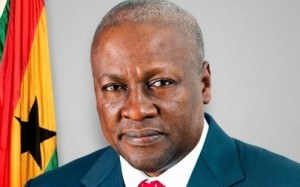Mahama promises full disclosure of Ghana oil contracts
 Vice President John Mahama on Sunday assured the public that information on all contracts on the oil find would be made known to the citizenry for public scrutiny.
Vice President John Mahama on Sunday assured the public that information on all contracts on the oil find would be made known to the citizenry for public scrutiny.
In a speech read on his behalf at the opening of a three-day conference on Right of Access to Information, he noted that access to information reduces corruption and enhances transparency and accountability.
“It is against this background that the government of Ghana has started publishing all information on contracts on our oil find,” he said.
The conference was organised by the US-based Carter Centre, in collaboration with the Media Foundation for West Africa, the World Bank (WB) Institute and other international and regional organisations.
It is the first in Africa and third in the series, after Atlanta and Peru, intended to explore the state of the right of access to information in Africa and identify steps to promote, entrench and sustain it.
Available statistics at the Carter Centre indicated that out of more than 80 countries in the world that have enforceable right to information legislations, only five are in Africa.
Out of the number only South Africa is enforcing the right.
Failure of political leadership, a culture of secrecy, low public awareness, competing priorities and institutional barriers such as weak public administration, poor record keeping systems, and lack of independent judiciary, among other things, have been identified as the main obstacles to the right of access to information in Africa.
In some African countries, like Zimbabwe, where access to information law exists, the legislation has rather become a source of oppression.
Meanwhile, efforts to advance the right of access to information are on-going in few African countries, notably Ghana, Nigeria, Mozambique and Zambia.
Mr. Mahama noted that in Ghana the Freedom of Information Bill had passed through Cabinet to Parliament and received its first reading on the floor of the House.
“Ghana is well on course to become the first West African country to have Freedom of Information legislation,” he said.
He noted that the Freedom and Independence of the Press as granted by Article 12 of the 1992 Constitution, has led to a dynamic media that had contributed immensely to Ghana’s status as the beacon on good governance in Africa.
The Vice President stressed the need to extend that kind of freedom plus access to public information to the entire citizenry, saying that access to information should be synonymous with Freedom of Movement, Of Association and other rights inherent in the Rule of Law.
“Lack of access to information will create a gulf of confidence between government and the governed, breed mistrust, suspicion, corruption and lack of faith in the building blocks of democracy.”
He expressed the hope that all African leaders would embrace the effort of the Carter Centre and take the conference recommendations in good faith.
Mr. Mahama said legitimate governments would not withhold information from the citizenry.
Former US President Jimmy Carter, Founder of the Carter Centre praised President John Evans Atta Mills for pushing forward the effort at passing the Freedom of Information Bill into Law.
He noted that the oil find in Ghana posed a tremendous challenge, saying that “a new source of wealth breeds a special prospect of corruption.”
President Carter however noted that President Mills had assured him that he would ensure full disclosure on the dealing in the oil industry to the public.
“President Mills also told me a third of the revenue will be put away for posterity, a third will be invested into education to benefit future leaders and a third will go directly into national treasury for current expenses.”
He noted that the conference would evolve with a practical and actionable roadmap dubbed: “The Africa Regional Plan of Action for the Advancement of the Right of Access to Information,” to help move the process forward in Africa.
Mr. Sanjay Pradhan, Vice President of the WB Institute said the Bank had recently approved a new access to information policy, which would lead to a complete cultural shift and ensure greater openness between the corporate entity and stakeholders.
He noted that the WB would be pushing three main steps in this direction – transparency, proactive disclosure and information and communication technology as a way of improving access to information and ensuring good governance.
Mr. Pradhan urged the international community to celebrate African leaders who show commitment to people’s right to public and private information, as a way of encouraging others to emulate them.
At least 131 participants including politicians and representatives of academia, media, civil society and others from 20 countries, mainly in Africa are attending the conference.
The Universal Declaration of Human Rights, the United Nations Convention against Corruption, and the African Charter on Human and People’s Rights make provisions for the public to have the right to information except security information.
Source: GNA
